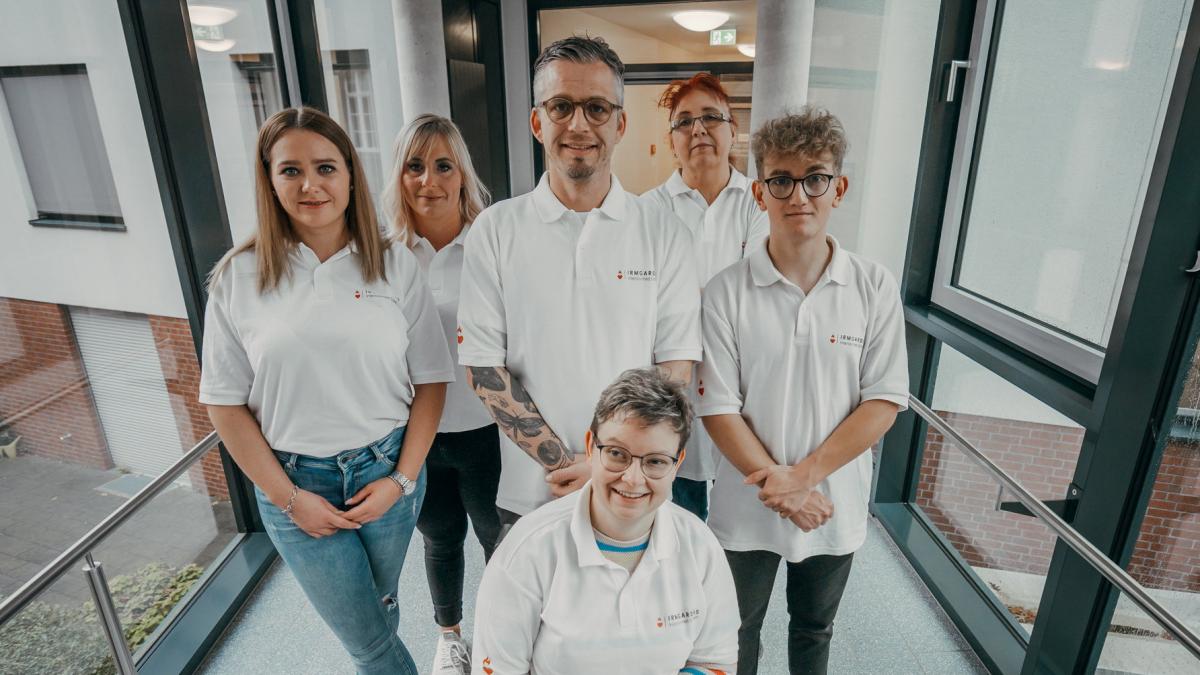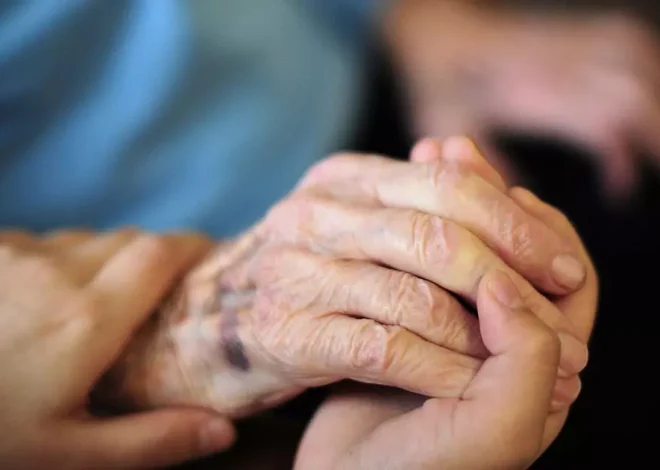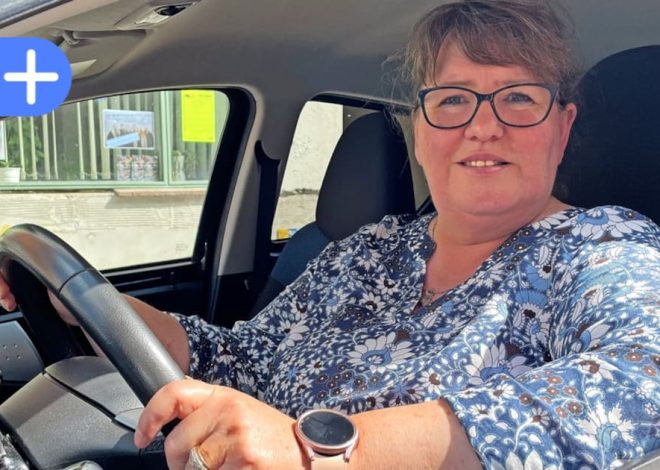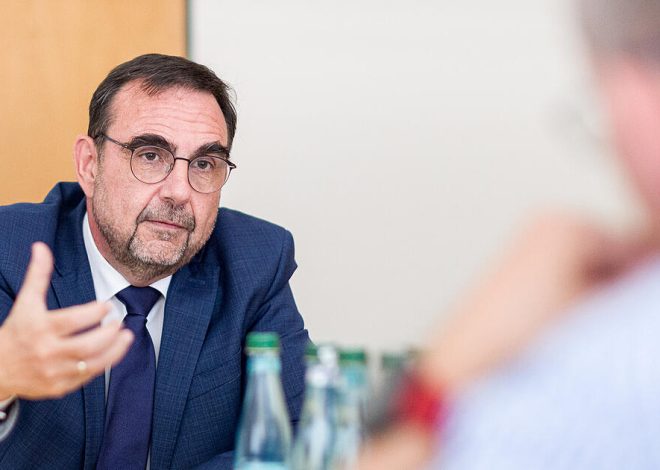
Care in an ageing society: Digital assistants make work more effective and replace missing staff
In NRW, several companies are working on digital assistants that are intended to make inpatient care more effective. The new applications are also intended to enable people to live longer in their own homes.
A young woman is sitting in a wheelchair in the Irmgardis residence in Viersen. The 21-year-old has a high level of care needs and needs round-the-clock supervision. If the carers do have to leave their apartment, however, they can still keep an eye on the patient at all times using the new “MySina” care app. Up to 35 parameters are monitored via a box in the room that is connected to the carer’s cell phone. From the patient’s movement to moisture on the mattress to a possible fall or the information that the patient might want to leave the room – all of this is registered and reported by the digital technology developed by the Mönchengladbach-based company IT-Care.
Michael Moersch is the first care entrepreneur in North Rhine-Westphalia to test the new product in six of 65 rooms in Viersen. So far there are 60 parties here, including 40 people who are actually in need of care. They are looked after by around two dozen employees. “The app allows our nursing staff to specify at any time which information they would like to know about which client in order to ensure individual care based on their care needs,” says Moersch, who runs a second nursing home in Saxony-Anhalt. The new app has also been in test operation there since the beginning of June. The aim is to react to events in inpatient care instead of routinely visiting people who need care without up-to-date information.
Health Minister welcomes developments
According to the Federal Statistical Office, the need for staff in the care sector is increasing as the number of people in need of care grows. In an ageing society, applications such as the IT-Care app can therefore be extremely helpful. Karl-Josef Laumann, NRW Minister for Health, is also convinced of this: “It is important to use the potential of digitalization to benefit high-quality care that is oriented towards people and to involve everyone involved in the transformation process,” the CDU politician told WELT AM SONNTAG.
The Ministry of Health does not, of course, make recommendations for individual products, for competition law reasons. There are already many apps from a wide range of providers in development or already on the market, it says. In addition to IT-Care, the Ministry names two other providers from North Rhine-Westphalia in Aachen and Wickede an der Ruhr. In Aachen, for example, the start-up NevisQ has developed a bed sensor that can be used in care facilities and also in private households. “Our nevisCura bed sensor enables an intelligent bed-exit alarm that makes everyday work noticeably easier for nursing staff,” explains 35-year-old managing director Christian Kind. Once attached to the bed and in just a few simple steps, the silent guard reports when a resident wants to get out of bed – even before they have even set foot on the floor. The sensor is also compatible with any standard call system and can be used in many places. The product has recently been available to order online from the retailer Amazon for 662 euros.
In Wickede, the Wissner-Bosserhoff company has developed the SafeSense 3 care assistant together with an Austrian start-up that it has acquired. It consists of a contactless, patented sensor pad that is positioned under the mattress and records the smallest pressure changes in real time. This makes it possible to record the movement activity of residents and patients and use the data to draw valuable conclusions about their individual movement profile. The care assistant has been on the market for a good two years, and several thousand units have already been installed in inpatient care facilities and clinics, says Marketing Director Rolf Christoph Haase. “As far as the costs for our customers are concerned, you can generally say that they pay a little more than one euro in rent per system per day.”
Dangers such as pressure sores and falls can be detected early and corresponding warnings can be recorded silently or forwarded to the nurse call system. Fewer patrols, but more patient and resident safety, “that is the declared aim of this new technology,” says Wickede.
The new digital assistants are also intended to help older people in the private sphere to stay at home longer and not have to go into a nursing home. Around 80 percent of those in need of care are currently being cared for at home, and their numbers are continuing to grow. According to a survey by the Frankfurt-based company Deutsche Leibrenten AG, 90 percent of people aged 65 and over do not want to leave their own homes if possible.
The entrepreneur Rolf Krause is behind IT-Care and the app “MySina”. “Demographic change is just around the corner, skilled workers are becoming scarce, while the number of people in need of care is increasing,” says the 68-year-old. He also founded IT-Care Holding AG based on personal experience with relatives in need of care, reports the engineer. Krause is convinced that the use of digital technologies and artificial intelligence can significantly improve the care situation.
Constant data flow from all rooms
Developing the particularly complex app was challenging, says Krause. “The difficulty was that various sensor information – such as falls, windows, doors and moisture – is summarized in one app and the events can be made available to several parties, such as relatives, nurses and doctors.” In facilities such as the one in Viersen, any number of rooms can be monitored simultaneously via a large screen in the nursing manager’s office. The constant flow of data can be accessed from anywhere, explains Krause. A simple traffic light rating helps to prioritize measures and ensures rapid intervention in an emergency. And all the data is collected in compliance with data protection guidelines and only forwarded to the nursing staff, IT-Care emphasizes.
Founder Rolf Krause has recently had his product tested in Halle an der Saale. The Halle-Neustadt housing cooperative there manages around 3,000 apartments with around 6,000 residents. In a first step, 30 apartments will be equipped with IT-Care technology, and later up to 300. The pilot project is testing “where intelligent technology can be used to identify, predict and prevent major illnesses,” says CEO Andreas Luther. The idea is to prevent people from going to a nursing home if possible.
IT-Care says the cost of the product is 300 euros per month for professional applications, such as in housing associations and in homes. Around 100 euros would be due for the app and a further 200 euros for the hardware, i.e. sensors and data box. There are also subsidy programs offered by health insurance companies to improve the living environment for installation at home.
“The future of care lies in the outpatient clinic,” says Michael Moersch from the Viersener Residenz Irmgardis, because nursing staff and beds are becoming scarce. “It is also very difficult to get nursing staff from abroad to come to Germany.” When Moersch tried to do this in one of his facilities, he was only successful with one nurse who came from Vietnam.
The care entrepreneur is satisfied with the first app experiences in Viersen. “We can save around 30 percent of the resources previously used – travel, administration and care – and concentrate more on the actual care.”

Ethel Purdy – Medical Blogger & Pharmacist
Bridging the world of wellness and science, Ethel Purdy is a professional voice in healthcare with a passion for sharing knowledge. At 36, she stands at the confluence of medical expertise and the written word, holding a pharmacy degree acquired under the rigorous education systems of Germany and Estonia.
Her pursuit of medicine was fueled by a desire to understand the intricacies of human health and to contribute to the community’s understanding of it. Transitioning seamlessly into the realm of blogging, Ethel has found a platform to demystify complex medical concepts for the everyday reader.
Ethel’s commitment to the world of medicine extends beyond her professional life into a personal commitment to health and wellness. Her hobbies reflect this dedication, often involving research on the latest medical advances, participating in wellness communities, and exploring the vast and varied dimensions of health.
Join Ethel as she distills her pharmaceutical knowledge into accessible wisdom, fostering an environment where science meets lifestyle and everyone is invited to learn. Whether you’re looking for insights into the latest health trends or trustworthy medical advice, Ethel’s blog is your gateway to the nexus of healthcare and daily living.



